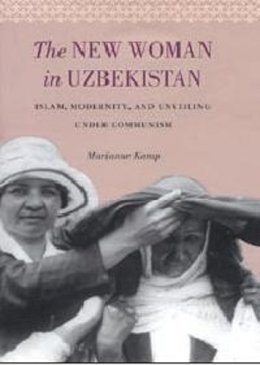
The New Woman in Uzbekistan
Marianne Kamp
Winner of the Association of Women in Slavic Studies Heldt Prize
Winner of the Central Eurasian Studies Society History and Humanities Book Award
Honorable mention for the W. Bruce Lincoln Prize Book Prize from the American Association for the Advancement of Slavic Studies (AAASS)
This groundbreaking work in women's history explores the lives of Uzbek women, in their own voices and words, before and after the Russian Revolution of 1917. Drawing upon their oral histories and writings, Marianne Kamp reexamines the Soviet Hujum, the 1927 campaign in Soviet Central Asia to encourage mass unveiling as a path to social and intellectual "liberation." This engaging examination of changing Uzbek ideas about women in the early twentieth century reveals the complexities of a volatile time: why some Uzbek women chose to unveil, why many were forcibly unveiled, why a campaign for unveiling triggered massive violence against women, and how the national memory of this pivotal event remains contested today.
Product Details
About Marianne Kamp
Reviews for The New Woman in Uzbekistan
Canadian Slavonic Papers
"Kamp's book is a remarkable study of societal changes triggered by Russian and Soviet rule in Central Asia. The focus on women's subjectivity and her admirable use of oral interviews against a backdrop of solid historical research expose the untapped potential of oral history: we get fascinating insights into Uzbek society during the first two decades of Soviet rule."
Revolutionary Russia
"A nuanced history of a complex era in Uzbekistan. . . . .highly [recommended] for Central Asian, Middle Eastern, women's studies, and oral history courses."
International Journal of Middle East Studies
"The book's target audience is likely to be scholars, but speaking from experience, advanced undergraduates will find the ideas interesting and the writing accessible. This work will reward anyone who is interested in ideas about self-construction and gendered representations in the public sphere."
Contemporary Islam
"This prize-winning and passionate book deserves a place on the bookshelf of any serious historian of Central Asia or specialist in Islamic women's studies. It is an inventive attempt to recover women's voices and explore the complexities of female agency; it breaks new ground in exploring Central Asian women's subjectivity . . . .This study sets a standard for feminist analysis of Central Asia; courses in women's studies, gender theory, and Islamic, Soviet, or oral history should consider assigning this accessible, well-written volume."
American Historical Review
"Kamp's work makes compelling reading and offers important insights not only for specialists on Central Asia but also for those studying the expansion of Soviet power to the periphery. . . . Her engagement of other important works on the region is sure to spark a lively debate over the motors and nature of social change."
Slavic Review
"An irreplaceable contribution to scholarly understanding of Central Asian culture and history."
The Russian Review
"Marianne Kamp's study of Uzbek women's experiences of the late twentieth century..is an extremely welcome addition to the literature on women in Central Asia..a very accessible book that will appeal to wide readership, from historians to women's studies scholars and students alike."
Europe-Asia Studies
"This book makes numerous original contributions, particularly in its collection of Uzbek women's life stories, which are used to highlight women's subjectivity and rational decisions about when and if to resist their subordination to men."
Canadian Journal of History
"This is a fine scholarly study on veiling. . . the book is certainly a useful addition to the literature covering the pro and cons of veiling. Moreover, it is relevant and timely."
Multicultural Review
"A very important contribution to our understanding of women emancipation policy from the late Tsarist period to WWII, and more widely to the history of Sovietization in the 1930s."
Central Eurasian Reader
